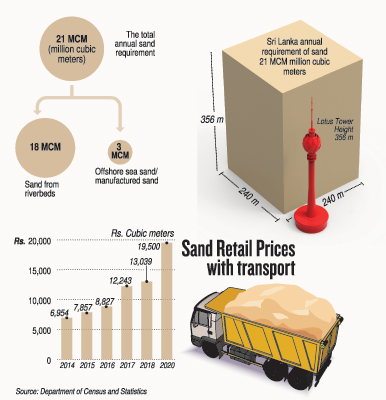News
Six months on, ‘temporary’ move over sand wreaks havoc
 The mines chief has proposed setting controlled prices for sand in each district to get over the mafia dealings that led the government to allow free transport of construction materials – a move that has ended with disastrous consequences for the environment.
The mines chief has proposed setting controlled prices for sand in each district to get over the mafia dealings that led the government to allow free transport of construction materials – a move that has ended with disastrous consequences for the environment.
Illegal sand miners are recklessly exploiting the current lack of regulated construction material transport. With no checks on how much sand is being transported it is easy for gangs to mine more sand than they are allowed and sell it where they like.
The government six months ago suspended the licence system for transporting building materials in the hope the move would break the hold of mafia over supply of those materials, and resultant price-fixing. It was hoped prices would come down once other players were free to enter the market.
Now accelerated sand mining is causing untold environmental damage, environmentalists said.
Although the government said the licence suspension would be “temporary” and new regulations would be announced, so far no such measures have taken.
The Director of the Environmental Conservation Trust, Sajeewa Chamikara, pointed out the Mines & Minerals Act No. 33 of 1993 – which stipulates a permit must be obtained for mining, excavating, storing, merchandising and transporting construction sand and other materials – was intended to ensure sustainable development of mineral resources.
Mr. Chamikara said the decision to suspend permits to transport sand “has completely violated the Mining and Minerals Act”.
He said the transport licence was linked to the mining licence and provided the only means the police and the Geological Survey and Mines Bureau (GSMB) could monitor the legality of mining activity.
Mr. Chamikara said illegal mining of sand was being carried out along major rivers: the Mahaweli, Deduru Oya, Ma Oya, Kalu Ganga and Kirindi Oya.
He said heavy mining had caused a drop below sea level in riverbed levels where waterways met the ocean, causing seawater to flow into rivers and make their waters saline. This affected drinking water supply and also jeopardised the survival of aquatic organisms found in river beds.
“Earlier this situation was controlled to a certain extent but it will worsen in future,” Mr. Chamikara said.
“As the election is near , the government has taken this decision to win over the sand license owners,” he alleged.
GSMB Chairman Anura Walpola, said he is setting up centres in each district to monitor mining activities.

Illegal mining of sand being carried out along the Mahaweli river
“The suspension of the law to obtain a licence for the transportation of sand, stones and soil was to be effective only for a short period and the president advised to take immediate action in this regard,” he said. “However it will take at least two months to find the exact solutions for the problem.
“The most immediate solution, which can be implemented soon, is to introduce a controlled price [for sand] for each district. Currently one cube of sand costs Rs. 6500 except in Ampara district.”
It is not clear how this system would prevent illegal mining.
Mr. Walpola said a smartphone app had been introduced to register vehicles transporting sand. “Even though this was implemented earlier there are certain things to be added to that,” he said.
“In future, anybody can log in to this app and check if the transportation of materials is valid and how many cubes they can excavate.” This information can be cross-checked at checkpoints.
Police said they have been ordered not to check vehicles transporting sand. “Acting Inspector General of Police C. D. Wickramaratne has instructed all police stations not to inspect the licence granted to transport sand, temporarily. It is the work of the GSMB to inspect illegal sand mining activities. We take illegal miners into custody and take legal actions against them.”

